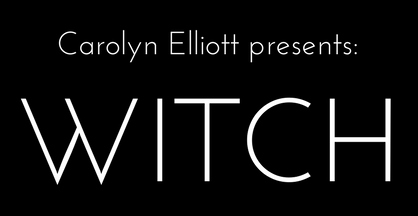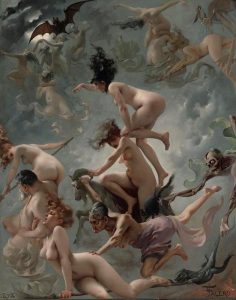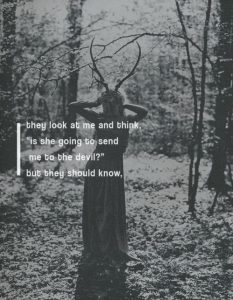by Pat Mosley
Aradia! Aradia! Daughter of Great Diana and Lucifer, we summon and stir thee!
Our high priestess calls to the Full Moon with sword pointed upward in the night sky.
One of the chief spirits of our circle, the Spirit of Revolutionary Witches, we call both down from heaven and up from within ourselves. She is Aradia, the daughter of the Devil.
On Earth and in our circles, her consort is Cernunnos, who is often the preferred god of other Witches in our line.
To us, Cernunnos is embodied by the men of our circle when they step into Pagan values like hospitality, solidarity with the marginalized, and caring for the planet, family, and home.
Neither Aradia nor Cernunnos exist entirely independent of us. They are ritual roles we adopt to bring ourselves further into alignment with the spiritual truths we hold dear, and as such, they grow and change slightly, informed by those who body for them.
Likewise, Great Lucifer and Diana take on an infinite number of forms.
To some, they are strictly pagan gods of a pre-Christian era. Others see them as proto-Satanic or post-pagan spirits, archetypes of the Witches, or simply names of Power we charge our work with.
This holy family of Lucifer, Diana, and Aradia comes from the late 19th century text Aradia, or the Gospel of the Witches compiled by Charles Leland.
Supposedly the text was shared with him by the descendent of those still practicing their Art in Italy. This may or may not be entirely factual, but either way, Aradia unlocked a spiritual revolution in the form of a religion most Witches have heard of: Wicca.
Although a vocal majority of Wiccans are squeamish around any talk of the Devil, this is not always the case.
Our coven embraces Aradia’s Luciferic parentage, and though even Leland argued that this Lucifer was not to be conflated with the Christian Satan, the text of Aradia identifies him clearly as the most evil of spirits as well as the ruler of Hell.
Why associate Wicca with any form of Satanism? That answer varies from practitioner to practitioner.
For me, it feels right. Aradia, whether historical, fantasy, or somewhere in between, speaks to the revolutionary nature of Witches.
There’s a truth in that spirit that gives meaning to the characters named, and that’s lost when Lucifer is sanitized into a nameless Horned God.
For others in our coven, the Satanic names are more tongue-in-cheek—late additions to realer pagan gods and spirits, mirthfully peppering our ritual work in homage to the dominant paradigm we leave behind.
For many of us there is a sense of rebellion and bad-witchy no-fucks-given-ness that the Satanic conjures to our work.
We live and work in the Bible Belt. The majority of us are Queer and/or Trans or otherwise gender-benders. Outside of the sanctuary of our coven, we are closeted by a lack of economic mobility, civil rights, and social acceptance, largely imposed on us by the same religious regime that defined the climate Aradia emerged from and paganism died in.
Embracing the Light-Bringer is to step into a self-worth often denied to the marginalized. This too is the nature of our Craft, and the reason Diana and Lucifer send Aradia to Earth.
In a world where injustice and discrimination are deemed the will of God, where declaring that Black & Trans Lives Matter is controversial, and where the wildly diverse commons is engineered into unnatural class divisions and strife, there is adversarial work to be done.
This work is the ongoing work of Witches and the original task of Satanic spirits.
Before Lucifer fathered the revolutionary Aradia, Satan was prayed to by psalmists seeking relief from oppression.
So too have Witches gathered their communities together—providing healthcare in the form of herbs and spells, organizing the potluck feasts of sabbats old, and giving us reason to shed class with clothes to mingle together, conspire, fuck, and find joy outside social order.
When I was initiated into the Wicca, I was given a kiss to know that I am loved here. Similarly, old witch-hunting manuals like the Compendium Maleficarum depicted witches kissing the Devil’s ass. To some it may appear degrading, but to me it has always looked much more erotic and magical.
To kiss the Light-Bringer is to kiss yourself, to give love to yourself, to take responsibility for your pleasure and wellbeing, to liberate yourself from the Hell of perpetual abuse, to revel in your darkness as a Queen, and direct your inner Luciferic light to greatness. To kiss the Light-Bringer is to degrade yourself in the eyes of a culture that doesn’t understand or value your pleasure, nor consider your full spectrum self worthy of love.
When we call Aradia into our magic, when we embody Cernunnos or any other Devil, we are kissing the Light-Bringer. We are raising Power, and relentlessly enacting our desires on the world around us. We become the Adversaries, the Lovers, the Witches, and the Devil.
About the Author:
featured image – source



